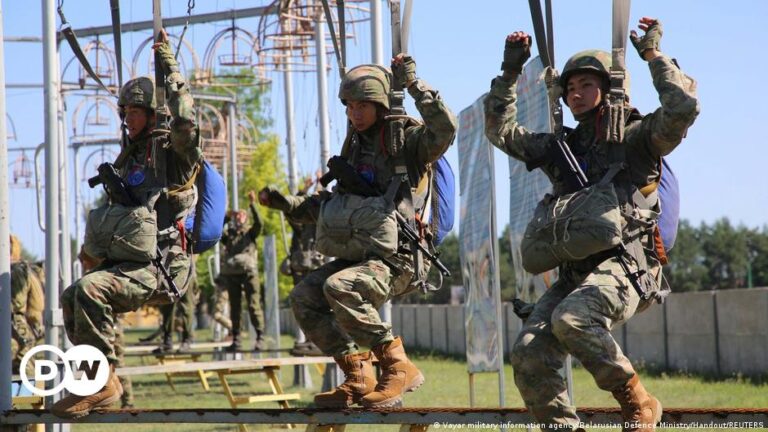Belarus and China launched joint counter-terrorism military drills on Monday. Dubbed Eagle Assault 2024, the 11-day exercise will see troops train in night landings, overcoming water obstacles and urban combat.
The joint drills came after Belarus joined the Shanghai Cooperation Organisation (SCO), a Eurasian political, economic and defence organisation led by Russia and China, earlier this month.
DW asked regional experts why Belarus needs the SCO and what joint exercises with China mean for the region.
Fight terrorism?
Belarus became the 10th member state of the SCO, which was originally made up of China, Russia, Kazakhstan, Kyrgyzstan, Tajikistan and Uzbekistan. Since the organization’s inception, India, Pakistan and Iran have also joined.
The SCO was initially intended to address border disputes between the top five countries. Joint security issues have since become a central focus, and member states regularly take part in joint counter-terrorism exercises.
Most experts agree that SCO members do not receive any financial or economic support from the organization. Rather, the organization serves as a forum for negotiations and discussions.
“The SCO brings together heads of state and government of various countries,” said Pavel Matskevich, a researcher at the Center for New Thought, a think tank specializing in Belarusian politics. “They can conduct bilateral talks between SCO summits.”
Dependence on Russia
Belarus had ties with China and India before joining the SCO, and for many years the European Union was Belarus’ second largest trading partner after Russia.
But Anastasia Ruzina, a researcher at the Belarusian Economic Research and Outreach Center (BEROC), believes Belarus’s authoritarian President Alexander Lukashenko has alienated the country from the international community, and “the economy has had to adapt to this new reality,” she said.
Experts explained that the sanctions against Belarus are part of a response to the state’s human rights violations against people protesting the fraudulent 2020 elections and their results, which are shrinking the country’s economy.
“Initially, authorities turned to Russia, but now they are looking for other markets,” Ruzygina said, adding that Belarus has decided that relying entirely on Russia is too risky, so Minsk is looking for alternative partners in case Russia goes into a downturn.
The researcher also noted that Belarus is trying to replace the European market with Asian partners, especially China, and she believes that Belarus’ new membership in the SCO is in line with this strategy.
“Political marriage”
Matskevich believes Belarus’ membership of the SCO would also boost its chances of joining the BRICS, which currently consists of Brazil, Russia, India, China, South Africa, the United Arab Emirates, Iran, Egypt and Ethiopia, and wants to be seen as a challenger to the Western G7 bloc.
“For Belarus, this is a marriage of convenience,” said Matskevich, the former diplomat. “The EU market is closed to them, access to the ports is closed. They are forced to use Russian and Chinese infrastructure and pursue trade with the Third World.”
Matukevich added that by joining the SCO and growing closer to the BRICS, Minsk also hopes to become less dependent on Russia, and he argued that Lukashenko clearly believes he will get something in return for supporting Russia, China and India.
Experts say China is Belarus’ second most important trading partner after Russia. “About 70 percent of Belarus’ trade is with Russia and about 10 percent with China,” Ruzygina said.
China has the upper hand in that relationship, she added: Shrinking trade ties with the EU have made Belarus more reliant on Chinese-made machinery, cars and consumer goods, while Belarus is exporting potash fertilizer (previously exported mainly to the West) and food to China.
Maneuvers on the Polish border
This week’s joint military drills between China and Belarus may seem like a result of Belarus joining the SCO, but in fact it is not the first military exercise the two countries have conducted together – the first took place in 2018 in Jinan, northeast China.
Currently, the two countries cooperate in Brest, in southwestern Belarus, just 2.8 km from the Polish border and 28 km from Ukraine.
But Matskevich said Belarus’s membership of the SCO probably had little to do with the military drills. “It takes time to prepare for that. It doesn’t happen overnight,” he explained, adding that these types of exercises always lead to tensions with neighboring countries.
From 2016 to 2020, before the popular protests began in Belarus, Minsk maintained a dialogue with NATO and even invited observers to NATO exercises. Experts believe that the current exercises in Belarus are likely to cause a stir in Russia, as they involve Chinese troops and are all taking place within Moscow’s sphere of influence.
“China has not done so, but I assess this as a kind of challenge to Russian influence in the region,” Matskevich concluded. “These exercises are further evidence of how closely Belarusian-Chinese relations have developed in all spheres.”
This article was originally published in Russian.

